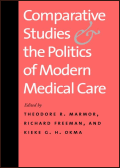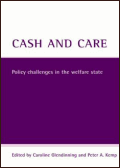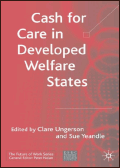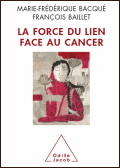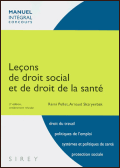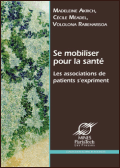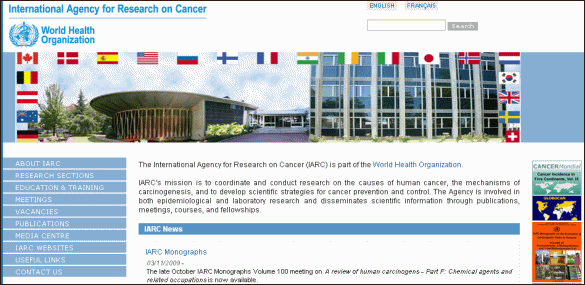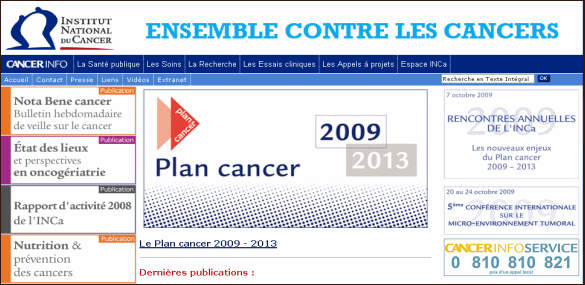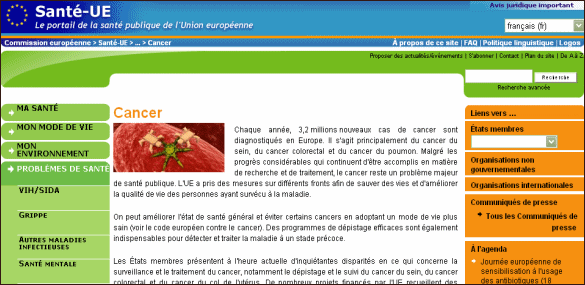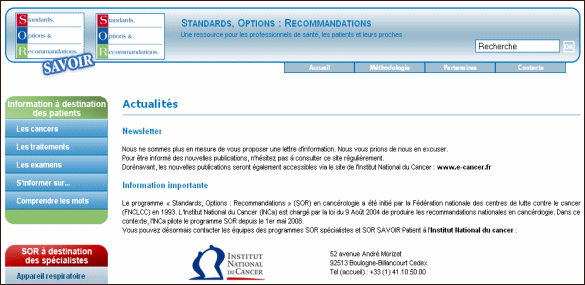LU POUR VOUS DE NOVEMBRE 2009 : livres du mois - sites du mois - working papers
Tous les lu pour vous
LES LIVRES DU MOIS
Etudes comparées sur la politique moderne de santé.
Comparative studies and the politics of modern medical care.
Marmor T.R., Freeman R., Okma K.G.H.
New Haven : Yale University Press. 2009. Pages : 14- 353 p.
His book offers a timely account of health reform struggles in developed democracies. The editors, leading experts in the field, have brought together a group of distinguished scholars to explore the ambitions and realities of health care regulation, financing, and delivery across countries. These wide-ranging essays cover policy debates and reforms in Canada, Germany, Holland, the United Kingdom, and the United States, as well as separate treatments of some of the most prominent issues confronting policy makers. These include primary care, hospital care, long-term care, pharmaceutical policy, and private health insurance. The authors are attentive throughout to the ways in which cross-national, comparative research may inform national policy debates not only under the Obama administration but across the world.
Argent et soins : les challenges de la qualité dans les politiques sociales.
Cash and care : quality challenges in the welfare state.
Glenndinning C., Kemp P.A.
Bristol : The Policy Press. 2006. Pages : 12 p. + 322 p.
This comprehensive and groundbreaking text provides the most up-to-date examination and critique of the interrelationships and changing boundaries between cash and care policy, delivery and theoretical developments in the United Kingdom and other advanced welfare states. This book opens up a new and fresh perspective on the aspects of money and the household. All the contributions of this book are well written and well researched...The individual contributions are all strong, and the articles have been picked with care to cover a wide spectrum of specific issues within the cash and care debates. Though there is a strong focus on the UK this is supplemented with many international comparisons, and the reader comes away with a deeper understanding of household care and cash issues as a whole.
L'argent pour les soins dans les politiques sociales des pays industrialisés.
Cash for care in developed Welfare States.
New York : Palgrave Macmillan. 2007. Pages : 13 p. + 214 p.
In many developed welfare states consumers of social services are increasingly given money rather than services so that they can buy in their own care. Many governments consider this to be the future of care especially for disabled and frail elderly people. This book explores the implications of these trends, not just for the older consumers but also for the workers involved, through cross-national case studies from Austria, France, Germany, Italy, the Netherlands, the United Kingdom and the USA. Whilst some schemes allow relatives to be paid as fully-fledged workers, some turn a blind eye, and others forbid it. Some schemes promote the social rights of care workers, whilst others do not. These issues are explored using new empirical data drawn from a cross-national study of elderly consumers and their careworkers. This study is a major contribution to comparative social policy, gerontology, the new sociology of work, women's studies and points to directions for the future of social care.
La force du lien face au cancer.
Bacque M.F., Baillet F.
Paris : Odile Jacob. 2009. Pages : 396 p.
Réalisé par des oncologues et des psychologues spécialisées en oncologie, cet ouvrage une nouvelle alliance entre le patient et le cancer. Ce lien face au cancer réunit les dimensions psychologique et somatique de la maladie, il unit la personne à son équipe médicale ; il unit tous les citoyens, dans une réflexion sur la place du cancer dans la société. Si les mythes du cancer font encore de l'annonce de la maladie un choc, la pratique d'une relation plus humaine du médecin et des soignants contribue à transformer cette énergie en prise en main d'une nouvelle vie. Si les technologies de pointe transforment la maladie en parcours du combattant, dialogue et médiation permettent une quête spirituelle de sens dans l'histoire de chacun. Les aspects psychologiques de ce parcours, de la prévention aux traitements, de la découverte de sa finitude à l'élaboration de nouvelles relations avec ses proches, sont abordés sans tabous dans ce livre-compagnon de route mais aussi plaidoyer pour un humanisme thérapeutique.
Leçons de droit social et de droit de la santé.
Pellet R., Skzryerbak A.
Paris : Editions Sirey-Dalloz. 2009. Pages : 642 p.
Les sujets des leçons sont tirés des programmes officiels des concours et traitent du droit du travail et des politiques de l'emploi (contrat de travail, normes collectives, marché du travail), de l'organisation et du financement de la protection sociale (sécurité sociale, régimes complémentaires, assurance chômage, aide et action sociales), du droit et des politiques de la santé (médecine libérale, établissements de santé, sociaux et médico-sociaux, tarification, planification et régionalisation). L'ouvrage prend en compte les réformes les plus récentes : loi du 25 juin 2008 sur la modernisation du marché du travail, loi constitutionnelle du 23 juillet 2008, loi du 1er août 2008 sur les droits et devoirs des demandeurs d'emploi, loi du 20 août 2008 portant rénovation de la démocratie socialeL'ouvrage s'adresse à tous les candidats ayant à passer une épreuve écrite (note de synthèse, note sur dossier, dissertation) ou orale de droit social ou de droit de la santé d'un concours administratif ou judiciaire (ENA, concours des assemblées, IRA, ENM...), social (EN3S, inspection du travail...), sanitaire et médico-social (EHESP...) ainsi qu'à tous les étudiants ayant une épreuve de ce type.
Se mobiliser pour la santé : des associations de patients témoignent.
Akrich M., Meadel C., Rabeharisoa V.
Paris : Presses de l'Ecole des Mines - ParisTech. 2009. Pages : 206 p.
Le domaine de la santé a été largement transformé depuis une vingtaine d'années par l'action des associations de patients. Ces associations s'impliquent dans la production et la diffusion de connaissances sur les maladies et les questions de santé ; elles jouent un rôle actif dans l'émergence et la consolidation des mobilisations collectives autour des problèmes de santé ; elles sont reconnues comme des acteurs à part entière de la démocratie sanitaire aux côtés des pouvoirs publics, des professionnels et des acteurs économiques. Face aux mutations pressantes du domaine, elles pensent et explorent de nouvelles formes d'action associatives, de nouveaux modes d'intervention publique. Cet ouvrage rend compte directement de l'expérience des associations, à travers une série de discussions collectives conduites avec une cinquantaine d'entre elles. Ces témoignages éclairent la compréhension du fonctionnement associatif et permettent d'appréhender les défis auxquels les associations sont aujourd'hui confrontées ; ils sont destinés à favoriser le dialogue entre les usagers, le monde politique et les professionnels.
LES SITES DU MOIS DE NOVEMBRE
Centre International de Recherche sur le Cancer (CIRC)/
International Agency for Research on Cancer (IARC)
www.iarc.fr
Presentation
Le Centre international de Recherche sur le Cancer (CIRC) fait partie de l'Organisation mondiale de la Santé. L'objectif du CIRC est de promouvoir la collaboration internationale dans la recherche sur le cancer. Il est interdisciplinaire, et réunit des compétences dans les disciplines de laboratoire, en épidémiologie et en biostatistique pour identifier les causes du cancer, qui permettront d'adopter des mesures préventives afin de réduire le fardeau et les souffrances liés à la maladie.
Son site abrite plusieurs bases de données, notamment une base sur l'épidémiologie des cancers et une base de monographies sur les risques de cancérogénicité pour l'Homme. Il offre également, outre les rapports des groupes de travail et les monographies, des publications en texte intégral sur ses thématiques de recherche : épidémiologie, prévention, pathologies et génétique, méthodologies statistiques
Institut national du cancer
www.e-cancer.fr
Presentation
L'Institut national du cancer a été créé par la loi de santé publique du 9 août 2004, dans le cadre du Plan cancer, pour pérenniser une politique nationale coordonnée de lutte contre le cancer. Placé sous la tutelle des ministères chargés de la santé et de la recherche, il fédère l'ensemble des acteurs de la lutte contre le cancer en France.
Son site reflète ses quatre pôles de compétence, à savoir la santé publique, la qualité des soins, la recherche et l'information au grand public et aux professionnels. Il publie en texte intégral des documents de référence pour les patients (présentation des différents cancers et traitement, la vie quotidienne), des outils d'information pour le grand public centrés sur le dépistage et des documents synthétiques et pratiques pour les professionnels. S'ajoutent à cela les rapports et expertises de l'Inca ainsi que ses recommandations.
Le volet recherche constitue également un axe central du site : présentation des plans cancers et les réalisations liées à ses mesures (canceropoles, recherche en biologie etc..), publications des différents appels à projets.
Santé UE : cancer
ec.europa.eu/health-eu/health_problems/cancer/index_fr.htm
Presentation
Cet espace du portail de l'Union Européenne est consacré aux activités de l'Union Européenne en matière de lutte contre le cancer. Elle regroupe les liens où l'on peut trouver des informations, classés selon les thématiques suivantes : santé publique, recherche, statistiques, liens externes à l'Union Européenne.
Standards, Options : Recommandations (SOR)
www.sor-cancer.fr
Presentation
Le programme « Standards, Options : Recommandations » (SOR) en cancérologie a été initié par la Fédération nationale des centres de lutte contre le cancer (FNCLCC) en 1993. Depuis 2008, le pilotage de ce programme a été repris par l'Institut national du cancer. Ce programme se décline en trois volets : Sor Savoir Patients, Sor Recommandations à destination des professionnels et Sor Recherche et développement.
Le programme Sor Savoir patients fournit des guides d'information sur différents cancers destinés aux personnes malades et à leurs proches. Les informations médicales contenues dans ces guides sont issues de documents scientifiques élaborés par des experts spécialistes du Cancer : Les Standards, Options : Recommandations (abrégés en SOR). Le site propose ces guides en texte intégral, classés par thématiques : cancer, traitements, examens, vie quotidienne, dictionnaire du cancer.
Le programme SOR à destination des professionnels comprend l'élaboration de recommandations pour la pratique clinique (RPC) en cancérologie, mais aussi de rapports d'évaluations technologiques, de bulletin de veille et de synthèses méthodiques, également disponibles sur le site.
Enfin, le troisième volet, axé sur la méthodologie d'élaboration des recommandations pour la pratique clinique fait l'objet d'une présentation synthétique.
VU DE L'ETRANGER : QUELQUES WORKING PAPERS ANALYSES
Assurance maladie
Revenu, pauvreté et couverture maladie aux Etats-Unis : 2008. 

Income, Poverty, and Health Insurance Coverage in the United States: 2008.
Denavas-Walt C., Proctor B.D., Smith J.C.
Washington : U.S. Government Printing Office. 2009. Pages : 67 p.
This report presents data on income, poverty, and health insurance coverage in the United States based on information collected in the 2009 and earlier Annual Social and Economic Supplements (ASEC) to the Current Population Survey (CPS) conducted by the U.S. Census Bureau. Data presented in this report indicate the following: Real median household income fell between 2007 and 2008.
Inégalités de santé
Des esprits sains dans des corps sains. Une comparaison internationale de l'influence de l'éducation sur les inégalités de santé chez les personnes âgées. 

Healthy minds in healthy bodies. An international comparison of education-related inequality in physical health among older adults.
Jurges H.
Mannheim Economics Department Discussion Papers. Mannheim : MEA. 2007. Pages : 26 p.
We study education-related inequality in the physical health of older adults across 11 European countries and the United States. Combining the data from Health and Retirement Study 2002, the English Longitudinal Study of Ageing 2002 and the Survey of Health, Ageing and Retirement in Europe 2004, our results suggest that education is strongly correlated with health both across and within countries. Education-related inequality in health is larger in Mediterranean and Anglo-Saxon countries than in western European countries. We find no evidence of a trade-off between health levels and equity in health. Education-related inequality in health is hardly driven by income or wealth effects (except in the United States), and differences in health behaviours (smoking) by education level contribute little to health differences across education groups.
Les femmes et la santé. La réalité d'aujourd'hui, le programme de demain. 

Women and health. Today's evidence, tomorrow agenda. 

Organisation Mondiale de la Santé. (OMS). Genève. CHE
Genève : OMS. 2009. Pages : 91 p.
Ce rapport concerne les femmes et la santé, c'est-à-dire les besoins des femmes en matière de santé mais aussi leur contribution à la santé des sociétés. La santé des femmes fait partie depuis longtemps des préoccupations de l'OMS mais, aujourd'hui, elle est devenue une priorité. Ce rapport explique pourquoi. Sur la base des données actuellement disponibles, il dresse un inventaire de ce que nous savons.
Médicaments
Enquête sectorielle dans le domaine pharmaceutique : rapport final. 

Pharmaceutical sector inquiry : final report.
Commission Européenne. (CE). Direction de la Concurrence. Bruxelles. BEL
Bruxelles : Office des publications officielles des Communautés européennes. 2009/07. Pages : 605 p.
Le secteur pharmaceutique est crucial pour la santé des citoyens européens, qui ont besoin d'un accès à des médicaments sûrs, innovants et abordables. Chaque Européen a dépensé en moyenne quelque 430 EUR pour des médicaments en 2007, somme qui continuera sans doute à croître en raison du vieillissement de la population européenne. Globalement, en 2007, le marché des médicaments à usage humain délivrés avec et sans ordonnance a représenté dans l'UE plus de 138 milliards EUR au prix départ usine et 214 milliards EUR au prix de détail. Le présent rapport s'inscrit dans le cadre des politiques et initiatives bien établies de la Commission concernant le secteur pharmaceutique, notamment la stratégie de Lisbonne, la stratégie dans le domaine des droits de propriété industrielle, la communication sur une vision nouvelle du secteur pharmaceutique et l'Initiative Médicaments Innovants. Il convient aussi de le mettre en parallèle avec les activités réglementaires de la Commission qui portent en particulier sur la sécurité, la qualité et l'efficacité des médicaments, la transparence des procédures nationales de fixation du prix et du niveau de remboursement et la protection des droits de propriété intellectuelle. En effet, vu l'importance de l'industrie pharmaceutique pour la croissance économique et l'emploi, ainsi que son rôle pour la santé publique, la Commission s'est engagée à mener des politiques susceptibles de créer un environnement propice à la viabilité de ce secteur. Cette enquête sectorielle est donc liée à d'autres initiatives de la Commission visant à assurer aux patients européens des médicaments sûrs, efficaces et abordables, tout en créant un environnement commercial capable de stimuler la recherche, de favoriser une innovation utile et de soutenir la compétitivité de l'industrie.
Prévention santé
Analyse de programmes nationaux de lutte contre le cancer en Europe. 

Analysis of National Cancer Control Programmes in Europe.
Atun R., Ogawa T., Martin-Moreno J.M.
Londres : Imperial college Business school. 2009/06. Pages : 97 p.
The objective of this study is to carry out a systematic assessment of the currently available National Cancer Control Plans (NCCPs) in Europe based on an analytical framework which consistently follows a health systems approach (examining not only the service provision aspect, but also issues of financing, resource generation and governance). The rationale for the investigation arises upon observing the emerging trend, propelled by repeated calls from patients, cancer experts and international bodies, to articulate an organized plan of action to face the cancer burden in all its settings. The researchers understand that an analysis using this approach will enable a consistent and objective comparison of planning to address the cancer burden in various settings: enabling systematic mapping of cancer plans in different countries and identifying the good practices and diversity that exists. In turn, this knowledge could be used to improve the quality and coherence of present and future cancer plans.
Santé et travail
Santé et bien-être au travail au Royaume-Uni. 

Health and wellbeing at work in the United Kingdom.
Hassan E., Austin C., Celia C.
Technical Report n° 758. Santa Monica : Rand corporation. 2009. Pages : 67 p.
The literature review is intended to provide evidence on whether health workplace interventions could be useful to mitigate health risk factors, and to reduce the costs associated with poor health and wellbeing in British workplaces and the NHS. In order to achieve this, the study : examines the extent of poor health and wellbeing in British workplaces and the NHS; (2) reviews the scholarly literature on the effectiveness of health workplace interventions in terms of health and work-related outcomes; and (3) identifies some lessons that can be learnt from a small group of ‘good practice' comparators identified by Dr Steve Boorman.
Vieillissement, stress lié au travail et santé. Revue des évidences. 

Ageing, work-related stress and health. Reviewing the evidence.
Griffiths A., Knight A., Nor Mohd Mahudin D.
Londres : The Age and Employment Network. 2009. Pages : 33 p.
This scientific literature review was jointly commissioned by TAEN - The Age and Employment Network, and Age Concern and Help the Aged. The majority of of reviews of research on work-related stress, its causes and its effects have been based on large groups of workers very rarely distinguished by age. This report aims to address the gap.
Soins de longue durée
Nouvelles directions pour les soins de longue durée en établissement. 

New Directions for Facility-Based Long Term Care.
Canadian Healthcare Association. (CHA). Ottawa. CAN, Association Canadienne des Soins de Santé. Ottawa. CAN
Ottawa : Canadian Healthcare Association. 2009. Pages : 168 p.
The Canadian Healthcare Association's brief New Directions for Facility-Based Long Term Care is now available. It highlights the need to achieve the appropriate balance of health services through a variety of means, including: matching the health service setting to the health condition; enhancing ongoing health services to the chronically ill, disabled and mentally ill; offering health services in the setting that is most cost-efficient and care-effective for each individual situation; and averting the premature admission to facility-based long term care of individuals who could move to supportive/assisted living arrangements (or remain in their own home) with the support of quality-driven home and community services. This should be achieved while recognizing that facility-based long term care is a desirable option for many people and not a dreaded institution of last resort.
Soins primaires
Programme de recherche en médecine générale et soins de santé primaires en Europe. 

Research agenda for General Practice/ Family Medicine and Primary Health Care in Europe.
Hummers-Pradier E., Beyer M., Chevallier P.
Maastricht : European General Practice Research Network. 2009. Pages : 69 p.
The Research Agenda for General Practice / Family Medicine and Primary Health Care in Europe aims to promote research in family medicine and to help family doctors to develop research proposals that are in line with the problems of practising physicians and their patients. It can also be seen as a tool for policy makers and other agencies interested in funding innovative research, since it identifies areas where research is needed. In that way, the agenda may be used as a guide for deciding about priorities in research.
Amélioration de la qualité dans les soins de santé primaire. 

Improving Quality in Primary Care.
Department of Health (DOH). London. GBR
Londres : Department of Health. 2009. Pages : 135 p.
This is a practical guide to support PCTs as commissioners of primary care, in working with local clinicians and other stakeholders - including patients - to promote continuous quality and productivity improvement in primary care services.
Systèmes de santé
Les projets de loi 2009 du Congrès réformant le système de santé : regard sur l'assurance maladie, le système de dispense des soins et le financement. 

The comprehensive congressional health reform bills of 2009 : a look at health insurance, delivery system and financing provisions.
Collins S.R., Davis K., Nuzum R.
New York : The Commonwealth Fund. 2009/10. Pages : 35 p.
This report provides an overview of key provisions of the two separate comprehensive health reform bills passed by the five committees of jurisdiction in the U.S. Congress: the Finance Committee and the Health, Education, Labor, and Pensions (HELP) Committee of the Senate, and the Ways and Means, Education and Labor, and Energy and Commerce committees of the House of Representatives. While the general frameworks of the bills are very similar—all bills include provisions intended to improve and expand coverage and all would create a comprehensive and coherent strategy for improving health care quality—they differ in a few key respects. Most important, the Senate Finance Committee bill does not include a public plan option or a requirement that employers offer coverage, nor does it reform for more than one year Medicare's formula for setting physician fees; the House bill includes all of these features.
Indice européen des consommateurs de soins de santé 2009. 

Euro Health consumer index 2009.
Health Consumer Powerhouse. Bruxelles. BEL
Bruxelles : Health Consumer Powerhouse. 2009. Pages : 67 p.
The Netherlands win the 2009 Euro Health Consumer Index (EHCI), for the second year in a row - the first time this happens since the EHCI started in 2005 - and with an outstanding margin. Nevertheless, Denmark keeps its runner-up position from last year. Besides the Dutch and Danish system there is a small group of strong performers: Iceland, Austria and Switzerland. There are general improvement trends among most of the measured healthcare systems, with examples of reform making impact not only in Netherlands but in Ireland and the Czech Republic as well. There is continuous decline in the Spanish or Greek healthcare systems which do not keep up with the improvement rate one can find in countries like the Netherlands, Denmark or Ireland. Large parts of Eastern and Central Europe seem to be affected by the financial crisis.
La santé en Australie pour l'année 2008 : le onzième rapport bi-annuel. 

Australia's health 2008 : the eleventh biennial report of the Australian Institute of Health and Welfare.
Australian Institute of Health and Welfare. (AIHW). Canberra. AUS
Canberra : Australian Institute of Health and Welfare. 2009/09. Pages : 276 p.
Australia's health 2008 is the 11th biennial health report of the Australian Institute of Health and Welfare. It's the nation's premier source of statistics and informed commentary on: - patterns and determinants of health and illness - health across the life stages - the supply and use of health services - expenditure and workforce - and health sector performance.
Vers des indicateurs nationaux de sécurité et de qualité dans les soins. 

Towards national indicators of safety and quality in health care.
Australian Institute of Health and Welfare. (AIHW). Canberra. AUS
Canberra : Australian Institute of Health and Welfare. 2009/09. Pages : 276 p.
This report sets out recommendations for a set of 55 national indicators of safety and quality in health care. The report concludes the National Indicators Project, a major project funded by the Australian Commission on Safety and Quality in Health Care (the Commission) and undertaken by the Australian Institute of Health and Welfare (AIHW) in close consultation with the Commission and a wide range of clinical and other stakeholders.
Vieillissement
La dernière année de la vie en Europe. Résultats initiaux issues de l'enquête SHARE. 

The Last Year of Life in Europe: Initial Findings from the SHARE Study.
Jurges H., Hank K.
Mannheim Economics Department Discussion Papers ; 141-2007. Mannheim : MEA. 2007. Pages : 26 p.
This article provides an explorative overview of the life circumstances of older Europeans in their last year of life. Using information from 526 end-of-life interviews conducted as part of the 2006-07 Survey of Health, Ageing and Retirement in Europe (SHARE), we detect a high prevalence of disability in the last year of life, varying by socio-demographic characteristics and geographic region. The most important sources of help in the year prior to death are children and children-in-law, but non-family also plays a major role, particularly in Northern Europe. Two fifths of the decedents died outside of institutions, this fraction being larger in Southern than in Northern Europe. Most decedents divide their bequests almost equally between their children. Our findings draw an initial picture of older European's last year of life and show, how the research potential introduced in this paper might expand once future waves of SHARE become available.
